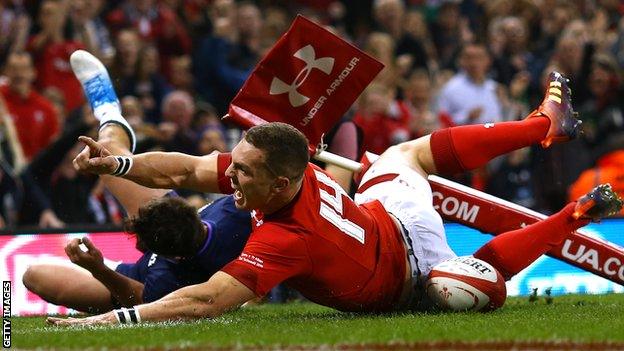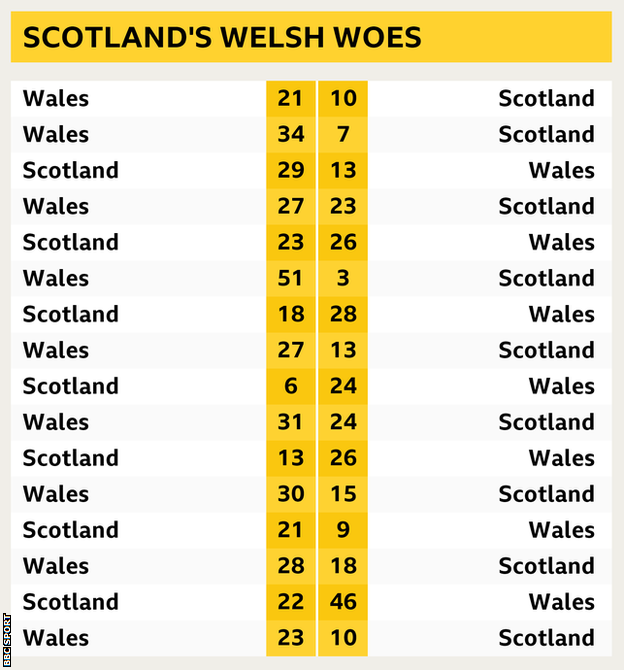Six Nations 2019: How do struggling Scotland breach the Welsh wall?
- Published
- comments

Wales have never lost to Scotland under Warren Gatland
Six Nations: Scotland v Wales |
|---|
Venue: Murrayfield Stadium, Edinburgh Date: Saturday, 9 March Kick-off: 14:15 GMT |
Coverage: Live on BBC One, BBC Radio 5 live, BBC Radio Scotland, BBC Radio Wales, BBC Radio Cymru & BBC Sport website and BBC Sport app, plus live text commentary online. |
Stymied by Ireland and shredded by France, struggling Scotland host Grand Slam-chasing Wales in the fourth round of the Six Nations.
Wales are on a record run of 12 straight wins and have beaten Scotland on all 10 occasions Warren Gatland has been at the helm.
So how do Gregor Townsend and his side go about stopping a Welsh team high in confidence and boasting a far superior head-to-head record?
BBC Sport pundit and Scotland's all-time leading points scorer Chris Paterson examines the areas they need to get right if they are to earn a morale-boosting win at Murrayfield.
Improve their accuracy
Scotland have conceded the most penalties in the Six Nations so far. Their total of 30 is 11 higher than Saturday's opponents.
They rank second for clean breaks with 35 - nearly 20 more than Gatland's side - but 32 handling errors, at an average of just over 10 per match, are costing Scotland tries.
Paterson feels tightening up their game, rather than a tactical overhaul, is what is required.
"Tactically, Scotland are playing the right way," he says. "They've just been inaccurate and lost possession, or committed silly errors and haven't finished off breaks.
"I know people look for different game plans or styles or to try something new. But I actually think accuracy is the key for Scotland. If they can play the way they like to play - that fast game - and they do it accurately, it gives them the best opportunity to win."
Watch: Paterson features in six of the best Scotland tries against Wales
Kick to space
Wales' clever kicking game has played a large part in their success thus far. They have kicked from hand, on average, almost 30 times per game in this Six Nations - the third-highest tally in the championship.
Their back-three are equally adept at fielding kicks too - Josh Adams' match-clinching try against England was the result of a Dan Biggar cross-fielder. Wing Adams and full-back Liam Williams have both collected 16 kicks, behind only England's Elliot Daly.
They are also a threat with ball in hand, which means Scotland's kicking game needs to be excellent.
"The Welsh back-three are exceptional at covering space, reading a kicker's body language and covering the ground accordingly," Paterson says. "England kicked 32 times against Wales but a lot of their kicks were poor. If Scotland see there are two or three in the backfield they should keep it in hand. If there's just one at the back, that's a lot of space, no matter how good you are, to cover.
"So Scotland must kick to space, rather than to contest. The chase is also really important. The chase against France wasn't what it should've been and it allowed them into the game."
Breach the Welsh wall
A stingy defence has also propelled Wales' record winning streak. In those 12 matches they have conceded an average of 14 points, and just 1.5 tries, per game.
The only team to score more than two tries against Wales on this run is Tonga - and that was in a 74-24 defeat. So how do Scotland breach the Welsh wall?
"Wales come off the line very quickly, they've got a really hard press defence that takes all the time and space away from you as an attacker," Paterson explains. "But it can be quite narrow at times. So if you can get the ball round it you can cause trouble, but it's very difficult to do. Scotland have to work hard off the ball to get two or three viable options for the ball-carrier, just to hold the Welsh on their heels.
"Also, if your first carry is good and you can get in behind it causes problems for a blitz defence because, even if you're tackled, it's very hard for the defence to retreat and then come forward hard again. So when they get in behind that's when Scotland can then reset and go wide.

Scotland have beaten Wales only once in the last 15 years